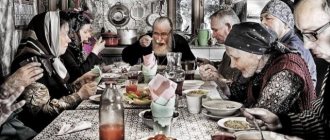Perception of death
In Orthodoxy, death does not mean the end of life, it is only a transition from one state to another, from earthly life to life beyond it. When a person is born, he begins his journey, but does not end it with death, because the soul is immortal. Therefore, it is important to fill it with good and righteous deeds in order to give the soul a chance to end up in heaven for eternity and not in hell. The teaching of Christ assures believers not to be afraid of death, but to expect it humbly, submitting to the will of God - as long as God has prepared to live on earth, so much will be enough. It turns out that there is no end, and earthly life is just a moment compared to the eternity that the soul will spend after the death of mortal flesh.
Third day after death
The third, ninth and fortieth days are considered wakes.
This also includes anniversaries. According to the teachings of the Church, a person’s soul does not leave the earth for the first two days after death. What is she doing? She is close to her body. She can hover around the house, visit places dear to her where the person was during his lifetime. But she does not do this alone - she is accompanied by an Angel. Such wanderings can be called goodbye to earthly life, with everything that was connected with it. The places she visits can be associated not only with joyful events, but also with sad ones. The soul of a once kind person flies where it did a lot of good - helped those in need, looked after someone. Most often she is near her body or home. The first two days she looks like a bird that flies in search of its own nest. The soul can visit several places, or it can be located exclusively near the dead flesh. When the third day arrives, she leaves the earth and appears before the Lord, leaving earthly life and her body forever. Now she has to see God and everything that the Angels want to show her. Therefore, on the third day, the relatives of the deceased pray for him, so that the soul can freely leave the earth and reach heaven.
What happens next? The soul finds itself in God's abode. She enjoys beauty, contemplates all the beautiful things that are there. This will happen for the next six days. Of course, during this time, being among the indescribable beauty and peace, she forgets about all her earthly sorrows - illnesses, problems, disappointments. She does not need to think about what the minds of people living on earth are occupied with. But this only happens if the soul is sinless. If she has many sins, she cannot enjoy. During these six days, the soul sees how sinless souls rejoice in the beauty surrounding them, and begins to regret that they lived their lives idly, made many mistakes and sins for which they did not repent during their lifetime. She awaits the ninth day with trepidation.
How to organize a funeral
The wake on the 9th day after death must include kutya. This is a ritual and traditional dish for the funeral table. It is prepared not only for funerals, but sometimes also for holidays. For the funeral meal, kutya is made from wheat, sugar, and honey. There is also kutia made from rice and raisins.
What should the relatives of the deceased do on the 9th day after death?
What to serve
- Kutia is not a simple dish; everything that is prepared for 9 days after death carries a sacred meaning. Seeds in kutya are the birth of a new life. It symbolizes the resurrection of man in the afterlife.
- Sugar, honey, jam are a symbol of sweet life after death. Kutya is consecrated in the church. But if this is not possible, then it’s okay. You can sprinkle it with holy water or simply read a prayer over it.
- What is served for 9 days after death: jelly or compote at the funeral table - this is also a mandatory dish. Any porridge can be on the table; sometimes pancakes and pies are prepared so that the filling is sweet.
- Fish dishes can also often be found at the funeral table; sandwiches with fish, sprats, herring and other fish snacks are approved. Borscht and noodles can be served as a first course. For hot kuru, roast.
- The feast on a sad occasion begins with the prayer “Our Father.” You can read it both aloud and silently. The first dish served is kutia.
- Alcohol is prohibited. Although there is drinking at any wake, traditionally there shouldn't be. Drunkenness is a sin; indulging in sin at a wake can harm the soul of the deceased. According to the same sign, you should not carry alcohol to the cemetery.
- You should not put a lot of food on the table, because gluttony is a sin. The table needs to be modest, without frills and pathos. Eating doesn't matter. The important thing is that people gathered to remember the person, and not to indulge in gluttony.
- But even if you rid the funeral table of luxury, then everything must be calculated so that there is enough for everyone. People come uninvited and therefore it is better to have a little in reserve. What remains after the funeral table must be distributed to the poor. Products should not be thrown away under any circumstances.
Is it worth inviting guests?
- On the ninth day, people are not invited to the wake; they are called uninvited. This means that people come to remember the person themselves if they want. It is not recommended to invite people to the funeral. People should come and remember the deceased themselves.
- According to tradition, there must be relatives, people who washed the deceased, those who made his coffin, and grave diggers. If all this was done by people from ritual services, then the tradition loses its relevance.
How to behave at a wake
You cannot laugh, have fun, or talk loudly at the table. What they say on the 9th day after death is that you cannot remember the deceased from the bad side, his unseemly actions, addictions. It’s either good or not good about the deceased.
Until the 40th day, a decision will be made about where he is in Heaven or Hell, so the negative will weigh on the bad side of the scales, and this directly leads to a terrible sentence.
The appearance of those who come should also be appropriate. Women's heads should be covered, preferably with a scarf, and their hair should be tied up. Men must remove their hats when entering the premises. Black mourning is worn only by family and friends.
Ninth day after death
With its onset, God commands the Angels to bring the soul to worship Him, after which the Lord will judge it.
Judgment will be made according to what is written in the Word of God - whether the person's life lived up to what is written in the Bible. It says that the Word will judge. During earthly life, every person has many times the opportunity to repent of his sins and begin to study Scripture in order to follow it and bring his life and thoughts into agreement with what is written in it. On this day, the relatives of the deceased pray especially intensely for him, asking God for mercy and forgiveness for the soul of their relative, so that it can enter heaven. But on this day the fate of the soul will not yet be decided. Her fate will not be clear until the fortieth day. During this period of time, it is important not only to pray, but also to remember the deceased only from the good side. You can set the table, but without alcohol. Not to have fun while sitting behind it, but to understand that the fate of the soul of their loved one is now being decided. At this time, she remembers all the bad things she has done, repents, and hopes for mercy. If you remember her with a bad word, it will hurt her even more.
In the interval between the ninth and fortieth day, Angels show souls hell so that they can look at the torment of those who refused to repent, recognize Jesus Christ as the son of God and accept His sacrifice for their sins, so that they do not lie as a heavy burden on them and do not influence God’s verdict . All these days the soul is in hell, therefore relatives on earth must behave calmly and meekly.
At this time, the soul of the deceased, according to church beliefs, must go through 20 ordeals, which are akin to the 20 deadly sins. Only after this will it become clear whether she is worthy of being in heaven. To alleviate the torment, relatives must not only pray, but also fast in order to help the soul of the deceased. The ordeals have levels, from less severe to more painful:
- Passion for excessive chatter and empty talk (idle talk).
- Deceiving others in order to gain benefit for oneself (lying).
- Spreading rumors and false information about people (slander).
- Excessive consumption of food (gluttony).
- Constant inaction and laziness (idleness).
- Taking someone else's property (theft).
- Excessive love for material values (love of money).
- Using dishonest means to obtain valuables (extortion).
- The desire to act dishonestly (untruth in deeds and actions).
- The desire to own what others have (envy).
- Considering yourself smarter and superior to others (pride).
- Unwillingness to control your anger and irritability (anger and rage).
- The desire to take revenge on the offender (grudge).
- Taking the life of another person (murder).
- Craving for magic (witchcraft).
- Sexual intercourse carried out promiscuously (fornication).
- Cheating on your husband (adultery).
- The desire to have intimacy with a person of the same sex (sodomy).
- Denying that God exists (heresy).
- A heart that is not susceptible to the grief of others (cruelty).
Only by passing these ordeals and repenting of them can one hope that the soul will find peace in paradise. It is believed that a test that a soul does not pass will constantly torment it in hell. Demons will torment her for eternity.
Tretina
The date of the funeral is set taking into account the day when the deceased passed away. Despite the fact that traditionally they talk about funerals on the third day, they actually take place two days after death. That is, if a person’s life was interrupted on the 1st, then the burial should take place on the 3rd. Funeral rituals are designed to facilitate the process of parting of the soul with its earthly shell: funeral service, burial, commemoration. At the wake, loved ones remember the deceased, pay tribute to his memory, after which his spirit, accompanied by heavenly angels, goes to meet the Lord. Along with tretinas, nineteens and forties are held to commemorate the deceased.
Fortieth day after death
On the 40th day, the restless soul finally knows where it will end up - hell or heaven.
She no longer remembers anything, does not lament anything, because she will forever be where the Lord has predestined her to live. After accepting God's will, oblivion and peace come. This happens if the soul goes to heaven. Once in hell, she will never be able to calm down again, there will be no more chance to repent before the Lord. All that remains is to endure endless torment and lament that earthly life has passed and was not under the control of God. Funerals on the fortieth day are important - you need to take them seriously, you cannot rejoice and have fun. Because on this day God chooses the eternity in which the soul will find itself after judgment.
Correct Remembrance
Knowing that the soul of a person appears before God on the 9th and 40th day, the relatives of the deceased need to know how to properly remember the deceased relative - what can be done and what is strictly prohibited. It is necessary to treat the soul that is awaiting its fate with compassion, to lighten its burden, to help it. To do this you need to know:
- At a funeral, there is no need to fall to the coffin of the deceased or his grave with screams and sobs. By doing this, people do not understand that they are bringing even more torment and torment to the soul. It is better to grieve in thoughts, being in contrition and praying that God will be merciful to the soul that will soon see Him.
- Since the 9th day is the beginning of God’s path, and the 40th is its end, when the Lord determines the place where she will remain for eternity, at a wake you cannot curse a person, speak badly about him, or remember his sins. The feast should be modest and thoughtful.
- During this time it is strictly forbidden to drink alcohol - this is not the time for fun. And you shouldn’t leave a shot of vodka with a piece of bread on the grave either, because it attracts the attention of tramps.
On the third or ninth day, you can cook kutya - porridge made from wheat seeds with the addition of honey or sugar. The seeds symbolize reincarnation, when the soul leaves the human body and remains in a different status. And honey or sugar “speak” that in another world the soul will have a sweet life, and not hellish torment. Everyone who came to the funeral should try kutya, at least one spoon.
Why the fortieth day?
Many believers are haunted by the question regarding the fortieth day of commemoration. Why this day? What does the number 40 mean? Why was this day chosen as the day to determine the fate of the soul and its fate? The answers to these questions must be found in the Bible:
- On the fortieth day, Jesus was taken up to the Father after he came to his disciples and told Thomas to look at His wounds and make sure that the Lord was alive (before this event, Thomas did not believe this and argued with those disciples who claimed that Jesus Christ is risen);
- Moses, at the age of forty, was called by the Lord in order to deliver his people from Egyptian slavery, where he was forced to work hard, erecting buildings and cities. Until this time, Moses was the prince of Egypt and did not think that he would be on the other side of his adoptive Egyptian mother.
These are just the big events associated with the number 40, but if you read Scripture carefully, you can find many more additional examples.
What does the Bible say about the separation of soul and body?
The Bible itself does not directly refer to the fact that after death the soul remains close to the body. However, some indirect facts may indicate this. If we recall the legend about the resurrection of Christ, we will understand that it happened on the third day - just before the moment when the thread connecting soul and body would have been broken irrevocably.
It is no coincidence that church funeral rituals are carried out on the third day. In the Holy Scriptures, one of the main ideas is the belief in the trinity of God the Father, God the Son and the Holy Spirit connecting them.
The soul of a child and a man who killed himself
It is believed that a child under 14 years of age cannot be held responsible for his actions, therefore, after death, his soul goes to heaven, where it does not need to stay in hell, see the torment of sinners and wait for God's predestination for it.
In heaven such a child meets one of his relatives. If the child is too young, then for the first two days, while he is still on earth, he does not understand why his death brings so much grief to his parents and relatives. After all, he simply returns to where he came from. The soul of a child who died in the mother's womb (difficult childbirth, miscarriage, abortion) does not suffer or suffer, as many believe. Some believers believe that until a woman who has had an abortion repents of killing her baby, his soul remains in torment and awaits this repentance. But that's not true. The baby is not responsible for his mother's sin, so his soul immediately goes to heaven. Regarding suicides, God does not allow a person to take his own life, because he did not give it to himself. God created man and only He can decide when to call His creation to judgment. There is an opinion that suicides immediately go to hell. This is wrong. The soul, having separated from the body, strives to get to heaven, but its gates are closed. After which she wants to return to her body, but this, unfortunately, is also impossible. Then she has no choice but to wait for the time of her death, which would happen according to God’s will. Several decades may pass before this time. Such a suspended state is painful for the soul, because it cannot find peace.
Is it worth thinking about death?
Thoughts about death are not sinful. And it is necessary to prepare for departure to another world, especially for those who feel that they have little time left. Usually these are elderly people. In modern times, organizing a funeral brings a lot of trouble and financial costs, so you need to prepare for them in advance. In this matter, one thing is important - not to predict the day of death, not to turn to fortune tellers in order to find out the date of the last day of life. This is considered an abomination to God. Scripture is clear about not turning to sorcerers or listening to them.
So, on day 3 the soul leaves the earth and appears before God. For the next six days she enjoys the sky and unearthly beauty. On the 9th day, the soul again appears before God and is sent by Him to hell in order to undergo 20 ordeals. After which the Lord determines whether the soul will spend eternity in heaven or in hell.
Psychological motives
Concluding the review, you can briefly leave the space of purely religious explanations and touch on the humanistic-secular side of what is happening.
The custom of burying on the 3rd day is not always carried out in practice due to faith. Whether a person is a believer or not, his attachment to the departed is based on primary emotions that bring together all people on earth. The death of someone who was dear to you is a heavy blow, a strange mixture of grief and stupor: family and friends cannot come to their senses. The deceased will no longer be in touch, will not be available, will not answer anything and will not appear in person: such simple things, but so hard to come to terms with. People simply need at least some amount of time for the event of death to be fully understood - and after that also to find the strength to ask for the deceased. Here we are given a hint by the etymology of the word “commemoration” - to remember, to remember: memory. People hold a farewell ceremony to commemorate someone.
You might be interested:
- Funeral benefit
- Funeral arrangements
- Words of condolences
July 4, 2018











